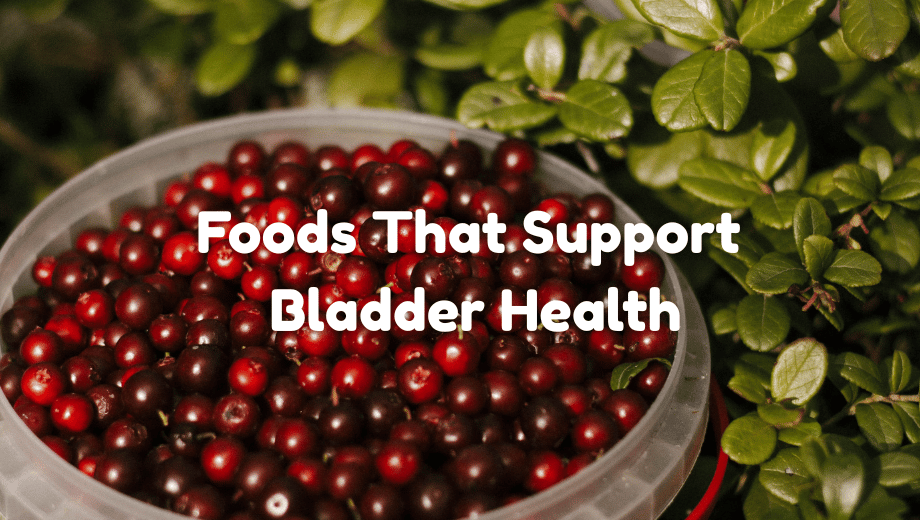As busy moms, we juggle a thousand things every day from managing school drop-offs to meal prepping and trying to squeeze in a little “me time.” With so much going on, bladder health rarely makes it to the top of the priority list. Yet, when something feels off that sudden urgency, discomfort, or recurring infections it quickly becomes impossible to ignore.
The truth is, your bladder health has a lot to do with what you eat and drink. Certain foods can soothe and protect your urinary system, while others can irritate it and increase your risk of infection or inflammation. The good news? A few small dietary changes can make a world of difference.Here’s your complete mom-friendly guide to bladder-healthy foods: simple, natural ways to stay balanced, hydrated, and comfortable every day.
Why Bladder Health Deserves Your Attention
The bladder may not get much credit, but it’s one of your body’s hardest-working organs. It stores and releases urine, filters waste, and plays a vital role in your overall hydration and comfort. When it’s irritated whether from infection, inflammation, or certain foods you’ll know it.
Common bladder issues like urinary tract infections (UTIs), overactive bladder, or irritation are especially common among women. Hormonal changes, pregnancy, menopause, and even dehydration can all affect bladder function.
If you ever experience severe pain, burning, or blood in your urine, don’t wait it out; it could indicate something more serious. The emergency room Waxahachie TX can help diagnose and treat symptoms quickly, preventing complications before they worsen.
Hydration: The Foundation of Bladder Wellness
It might sound simple, but staying hydrated is your first line of defense. Water flushes out bacteria, dilutes urine, and helps maintain a healthy balance in your urinary tract.
Aim for 6–8 glasses of water per day, depending on your activity level and environment. If plain water isn’t your favorite, try infusing it with fresh cucumber, lemon, or berries for flavor without added sugar.Avoid overdoing caffeine and alcohol both act as diuretics, making your bladder work overtime and potentially increasing irritation.
Top Foods That Support Bladder Health
A balanced diet can do wonders for your bladder. Focus on foods that reduce inflammation, support hydration, and promote a healthy urinary tract.
1. Berries (Especially Cranberries and Blueberries)
Cranberries are the classic bladder-health food and for good reason. They contain proanthocyanidins, compounds that help prevent bacteria from sticking to the bladder wall. Blueberries offer similar benefits and are loaded with antioxidants that fight inflammation.
Opt for fresh or frozen berries over sweetened juices. Many cranberry drinks on store shelves contain added sugar, which can actually feed bacteria and worsen symptoms.
2. Leafy Greens and Colorful Vegetables
Spinach, kale, carrots, and bell peppers are rich in vitamins A and C, both of which help strengthen the bladder lining and support immune function. Their natural hydration and low acidity make them ideal for everyday meals.
3. Probiotic Foods
Yogurt, kefir, and fermented foods like sauerkraut help balance the gut microbiome — which is directly linked to urinary health. A healthy gut can reduce the risk of recurrent UTIs by keeping harmful bacteria in check.
4. Fiber-Rich Foods
Constipation can put pressure on your bladder, leading to discomfort and even leakage. Whole grains, fruits, vegetables, and legumes keep your digestion smooth and your pelvic area relaxed.
5. Omega-3-Rich Foods
Salmon, chia seeds, and walnuts are loaded with omega-3 fatty acids that fight inflammation throughout the body — including the bladder. These healthy fats also support hormone balance, which can affect bladder control in women.
Foods and Drinks to Limit
Just as some foods help your bladder, others can make things worse. While every person is different, some common culprits include:
- Caffeine: Found in coffee, tea, and chocolate can irritate the bladder and increase urgency.
- Carbonated Drinks: The bubbles can cause bloating and discomfort.
- Citrus and Tomatoes: Their acidity may aggravate sensitive bladders.
- Artificial Sweeteners: Often found in diet drinks they can trigger bladder spasms.
- Spicy Foods: Delicious but not always friendly to your urinary tract.
Try cutting back on these items and notice if your symptoms improve over a few weeks.
Beyond Food: Lifestyle Habits That Help
Nutrition is key, but your daily habits matter, too. A few small lifestyle shifts can go a long way in protecting your bladder health:
- Don’t hold it in. Waiting too long to use the bathroom can strain the bladder muscles.
- Empty your bladder fully. Take your time when urinating to prevent bacteria buildup.
- Practice good hygiene. Wipe front to back and wear breathable cotton underwear.
- Stay active. Gentle exercise improves circulation and reduces inflammation.
If symptoms persist or worsen, it may be time for professional evaluation or advanced emergency care to rule out infection or other underlying issues.
Creating a Bladder-Friendly Family Menu
Since moms often handle the grocery shopping and meal prep, focusing on bladder-friendly meals benefits everyone at home. Try adding smoothies with berries and yogurt, serving grilled salmon with steamed greens, or swapping soda for sparkling water with cucumber slices.
Small, consistent changes are more effective than temporary “diets.” Over time, these habits can reduce bladder irritation and promote overall wellness for the whole family.
Why Moms Should Prioritize Their Own Health
It’s easy for moms to prioritize everyone else first, but self-care isn’t selfish, it’s essential. When your body feels good, you have more energy, focus, and patience to give to those around you. At BoredMom, we believe that wellness starts with awareness. Knowing what fuels your body (and what doesn’t) helps you live more intentionally with less discomfort and more confidence.
So the next time you fill your grocery cart, think of your bladder as part of your wellness journey. Nourish it with water, whole foods, and daily mindfulness. Your future self will thank you.




